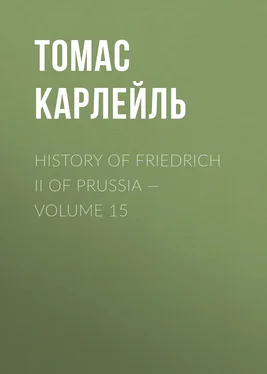Томас Карлейль - History of Friedrich II of Prussia — Volume 15
Здесь есть возможность читать онлайн «Томас Карлейль - History of Friedrich II of Prussia — Volume 15» — ознакомительный отрывок электронной книги совершенно бесплатно, а после прочтения отрывка купить полную версию. В некоторых случаях можно слушать аудио, скачать через торрент в формате fb2 и присутствует краткое содержание. Жанр: foreign_prose, История, literature_19, foreign_edu, foreign_antique, на английском языке. Описание произведения, (предисловие) а так же отзывы посетителей доступны на портале библиотеки ЛибКат.
- Название:History of Friedrich II of Prussia — Volume 15
- Автор:
- Жанр:
- Год:неизвестен
- ISBN:нет данных
- Рейтинг книги:5 / 5. Голосов: 1
-
Избранное:Добавить в избранное
- Отзывы:
-
Ваша оценка:
- 100
- 1
- 2
- 3
- 4
- 5
History of Friedrich II of Prussia — Volume 15: краткое содержание, описание и аннотация
Предлагаем к чтению аннотацию, описание, краткое содержание или предисловие (зависит от того, что написал сам автор книги «History of Friedrich II of Prussia — Volume 15»). Если вы не нашли необходимую информацию о книге — напишите в комментариях, мы постараемся отыскать её.
History of Friedrich II of Prussia — Volume 15 — читать онлайн ознакомительный отрывок
Ниже представлен текст книги, разбитый по страницам. Система сохранения места последней прочитанной страницы, позволяет с удобством читать онлайн бесплатно книгу «History of Friedrich II of Prussia — Volume 15», без необходимости каждый раз заново искать на чём Вы остановились. Поставьте закладку, и сможете в любой момент перейти на страницу, на которой закончили чтение.
Интервал:
Закладка:
"Friedrich's Manifesto—under the modest Title, 'ANZEIGE DER URSACHEN (Advertisement of the Causes which have induced his Prussian Majesty to send the Romish Kaiser's Majesty some Auxiliary Troops)'—had appeared in the Berlin Newspapers Thursday, 13th, only two days before. An astonishment to all mankind; which gave rise to endless misconceptions of Friedrich: but which, supporting itself on proofs, on punctually excerpted foot-notes, is intrinsically a modest, quiet Piece; and, what is singular in Manifestoes, has nothing, or almost nothing, in it that is not, so far as it goes, a perfect statement of the fact. 'Auxiliary troops, that is our essential character. No war with her Hungarian Majesty, or with any other, on our own score. But her Hungarian Majesty, how has she treated the Romish Kaiser, her and our and the Reich's Sovereign Head, and to what pass reduced him; refusing him Peace on any terms, except those of self-annihilation; denying that he is a Kaiser at all;'—and enumerates the various Imperial injuries, with proof given, quiet footnotes by way of proof; and concludes in these words: 'For himself his Majesty requires nothing. The question here is not of his Majesty's own interest at all [everything his Majesty required, or requires, is by the Treaty of Berlin solemnly his, if the Reich and its Laws endure]: and he has taken up arms simply and solely in the view of restoring to the Reich its freedom, to the Kaiser his Headship of the Reich, and to all Europe the Peace which is so desirable.' [Given in Seyfarth, Beylage, i. 121-136, with date "August, 1744."]
"'Pretences, subterfuges, lies!' exclaimed the Austrian and Allied Public everywhere, or strove to exclaim; especially the English Public, which had no difficulty in so doing;—a Public comfortably blank as to German facts or non-facts; and finding with amazement only this a very certain fact, That hereby is their own Pragmatic thunder checked in mid-volley in a most surprising manner, and the triumphant Cause of Liberty brought to jeopardy again. 'Perfidious, ambitious, capricious!' exclaimed they: 'a Prince without honor, without truth, without constancy;'—and completed, for themselves, in hot rabid humor, that English Theory of Friedrich which has prevailed ever since. Perhaps the most surprising item of which is this latter, very prominent in those old times, That Friedrich has no 'constancy,' but follows his 'caprices,' and accidental whirls of impulse:—item which has dropped away in our times, though the others stand as stable as ever. A monument of several things! Friedrich's suddenness is an essential part of what fighting talent he has: if the Public, thrown into flurry, cannot judge it well, they must even misjudge it: what help is there?
"That the above were actually Friedrich's reasons for venturing into this Big Game again, is not now disputable. And as to the rumor, which rose afterwards (and was denied, and could only be denied diplomatically to the ear, if even to the ear), That Friedrich by Secret Article was 'to have for himself the Three Bohemian Circles, Konigsgratz, Bunzlau, Leitmeritz, which lie between Schlesien and Sachsen,' [ Helden-Geschichte, i. 1081; Scholl, ii. 349.]—there is not a doubt but Friedrich had so bargained, 'Very well, if we can get said Circles!' and would right cheerfully have kept and held them, had the big game gone in all points completely well (game, to reinstate the Kaiser BOTH in Bohemia and Bavaria) by Friedrich's fine playing. Not a doubt of all this:—nor of what an extremely hypothetic outlook it then and always was; greatly too weak for enticing such a man."
Friedrich goes in Three Columns. One, on the south or left shore of the Elbe, coming in various branches under Friedrich himself; this alone will touch on Dresden, pass on the south side of Dresden; gather itself about Pirna (in the Saxon Switzerland so called, a notable locality); thence over the Metal Mountains into Bohmen, by Toplitz, by Lowositz, Leitmeritz, and the Highway called the Pascopol, famous in War. The Second Column, under Leopold the Young Dessauer, goes on the other or north side of the Elbe, at a fair distance; marching through the Lausitz (rendezvous or starting-point was Bautzen in the Lausitz) straight south, to meet the King at Leitmeritz, where the grand Magazine is to be; and thence, still south, straight upon Prag, in conjunction with his Majesty or parallel to him. [ Helden-Geschichte, i. 1081.] These are the Two Saxon Columns. The Third Column, under Schwerin, collects itself in the interior of Silesia; is issuing, by Glatz Country, through the Giant Mountains, BOHMISCHE KAMME (Bohemian COMBS as they are called, which Tourists know), by the Pass of Braunau,—disturbing the dreams of Rubezahl, if Rubezahl happen to be there. This, say 20,000, will come down upon Prag from the eastern side; and be first on the ground (31st August),—first by one day. In the home parts of Silesia, well eastward of Glatz, there is left another Force of 20,000, which can go across the Austrian Border there, and hang upon the Hills, threatening Olmutz and the Moravian Countries, should need be.
And so, in its Three Columns, from west, from north, from east, the march, with a steady swiftness, proceeds. Important especially those Two Saxon Columns from west and north: 60,000 of them, "with a frightful (ENTSETZLICH) quantity of big guns coming up the Elbe." Much is coming up the Elbe; indispensable Highway for this Enterprise. Three months' provisions, endless artillery and provender, is on the Elbe; 480 big boats, with immense VORSPANN (of trace-horses, dreadful swearing, too, as I have heard), will pass through the middle of Dresden: not landing by any means. "No, be assured of it, ye Dresdeners, all flurried, palisaded, barricaded; no hair of you shall be harmed." After a day or two, the flurry of Saxony subsided; Prussians, under strict discipline, molest no private person; pay their way; keep well aloof, to south and to north, of Dresden (all but the necessary ammunition-escorts do);—and require of the Official people nothing but what the Law of the Reich authorizes to "Imperial Auxiliaries" in such case. "The Saxons themselves," Friedrich observes, "had some 40,000, but scattered about; King in Warsaw:—dreadful terror; making COUPURES and TETES-DE-PONT;—could have made no defence." Had we diligently spent eight days on them! reflects he afterwards. "To seize Saxony [and hobble it with ropes, so that at any time you could pin it motionless, and even, if need were, milk the substance out of it], would not have detained us eight days." [ OEuvres de Frederic, iii. 53.] Which would have been the true plan, had we known what was getting ready there! Certain it is, Friedrich did no mischief, paid for everything; anxious to keep well with Saxony; hoping always they might join him again, in such a Cause. "Cause dear to every Patriot German Prince," urges Friedrich,—though Bruhl, and the Polish, once "Moravian," Majesty are of a very different opinion:—
"Maria Theresa, her thoughts at hearing of it may be imagined: 'The Evil Genius of my House afoot again! My high projects on Elsass and Lorraine; Husband for Kaiser, Elsass for the Reich and him, Lorraine for myself and him; gone probably to water!' Nevertheless she said (an Official person heard her say), 'My right is known to God; God will protect me, as He has already done.' [ Helden-Geschichte, ii. 1024.] And rose very strong, and magnanimously defiant again; perhaps, at the bottom of her heart, almost glad withal that she would now have a stroke for her dear Silesia again, unhindered by Paladin George and his Treaties and notions. What measures, against this nefarious Prussian outbreak, hateful to gods and men, are possible, she rapidly takes: in Bohemia, in Bavaria and her other Countries, that are threatened or can help. And abates nothing of heart or hope;—praying withal, immensely, she and her People, according to the mode they have. Sending for Prince Karl, we need not say, double-quick, as the very first thing.
Читать дальшеИнтервал:
Закладка:
Похожие книги на «History of Friedrich II of Prussia — Volume 15»
Представляем Вашему вниманию похожие книги на «History of Friedrich II of Prussia — Volume 15» списком для выбора. Мы отобрали схожую по названию и смыслу литературу в надежде предоставить читателям больше вариантов отыскать новые, интересные, ещё непрочитанные произведения.
Обсуждение, отзывы о книге «History of Friedrich II of Prussia — Volume 15» и просто собственные мнения читателей. Оставьте ваши комментарии, напишите, что Вы думаете о произведении, его смысле или главных героях. Укажите что конкретно понравилось, а что нет, и почему Вы так считаете.









